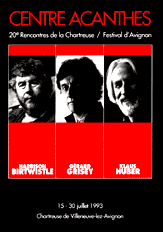Centre Acanthes 1993: fresh in from a year in Denmark studying composition with Vikings Per Nørgaard, Karl Aage Rasmussen and Hans Abrahamsen, I found myself in the south of France just outside Avignon during the summer festival period at the academy created by Claude Samuel in 1977. Percussionist Sylvio Gualda and three composers were invited to give workshops: Harrison Birtwistle, who walked in the first day of his workshop carrying a huge plant he had uprooted somewhere in the woods daring us to name it… no one could; the ex-spectralist (as he described himself) Gérard Grisey, who would gently berate me for, among other things, being a ‘compositeur prolifique” – I had to confirm what that meant in French because I was surprised to be accused of such a sin, but then I didn’t know Grisey’s work at the time; and the wild, to my mind, Klaus Huber. ‘Wild’ because he was the most exited in class and probably the hardest to translate to a room full of young composers coming from all over the world. Even after a year with the likes of Nørgaard and Rasmussen filling my head, I was still taken aback by the extreme intellectual rigour of his discourse, the depth of his analysis and the sheer breadth of his musical understanding. Actually, that’s not entirely true, I remember being more than a little bored by the extremely long presentations of his work with all the in-depth and colour coded analysis… It was only later that I began to understand the profundity of the man and the composer.
I had prepared a piece for a workshop with Ensemble Contrechamps, something based on Dante’s descent into hell, that was led by Klaus Huber. I was very exited about showing off all the new and extended techniques I had been honing after a year studying in Aarhus. The writing used all kinds of proportional and graphic notation, the performers were asked to do some of the most bizarre things imaginable with their bows and fingers, but the percussionist was the most ‘abused’ in my sketched out triptych. I had met Gert Sorenson in Denmark and heard, and loved, his rendition of Rebonds. In my acanthion delirium, I had crammed just about everything imaginable into the percussion part, but nicely arranged in the technique I had learned from Gert. The part for percussion was for percussionist playing percussion instruments… all of them. And I was asking for ‘ingenious’ extended techniques (all of them) to be used by the player.
After what seemed like hours (couldn’t have been, because there were other composers waiting their turn), and numerous sweaty explanations to the performers and some helpful and calm instructions from Huber as he watched and listened with both intent and, maybe, a certain impatience, and after some tense exchanges between me and the players and a semblance of a run though, it was time for the lesson. Klaus took my score and schooled me thoroughly in writing for performers. By this I mean, writing for people as much as for the instrument. This would be, strangely, a leitmotif during the workshops because both Birtwistle and Grisey would emphasise the importance of the composer/performer relationship… in totally different styles, of course.
I would like to say that I took this well, but pride would get in the way of that (for a while) and at that time I argued, more than a little, that these techniques were all being used in his own music, etc., etc. He would not be led down that path and in his very lively and professorial demeanour, he continued: ‘You must write a piece for solo bass drum, and methodically experiment with different mallets and concentrate only on timbre, for example, before rewriting your Dante piece.’
Absolutely brilliant advice from someone who knows but, at the time, I thought was full of sh*t. I came to understand rather soon, however, the wisdom of those words and the source of his advice, and I use it now, in various forms, when I am working with young composers.
I look back at Acanthes as a magical moment where I learned a lot about being a professional (I was interviewed on Radio France during the workshop and this is pretty much what I tried to say then). Being around these composers, all of them quite different, provided clear models of behaviour and approaches to making music. An eclectic group of creators in which Huber was clearly the master at the art of teaching. This would/could only be confirmed years down the road for me. Maybe the most obvious sign of a great teacher is the transparency of the lesson that crystallises with time.
I would later work with Birtwistle. I would also meet Grisey several times before his untimely death. We talked and joked a little (really) after the premiere, in the 1995 Festival Présences, of his work for TWO bass drums… and different mallets: Stèle (1995). After hearing this magical work, I (grudgingly) accepted what Maestro Huber had been harping about, and said as much to Grisey after the performance.

My experience with Klaus Huber was short, not necessarily sweet, but high in tannins. A vintage Huber that I have grown to appreciate. I’d like to say that in the end, I got it. Thank you, Klaus Huber.




